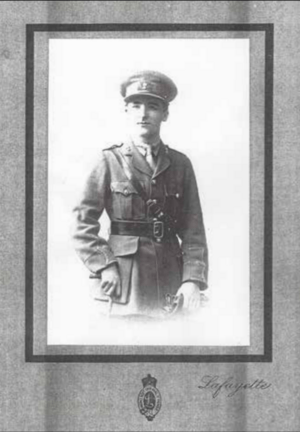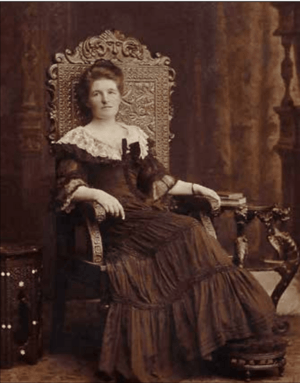Elizabeth Gould Bell facts for kids
Elizabeth Gould Bell (born December 24, 1862 – died July 9, 1934) was a very important doctor from Ireland. She was one of the first women to become a doctor in the northern part of Ireland, called Ulster. Elizabeth was also a strong supporter of women's rights. She was one of the first women to work as a doctor with the Royal Army Medical Corps, helping soldiers in Malta.
Contents
Early Life and Family
Elizabeth Gould Bell was born in 1862 in Newry, a town in County Armagh, Ireland. Her father, Joseph Bell, was a well-known clerk. Her mother, Margaret Smith Bell, came from a farming family.
Elizabeth had four brothers and sisters. Her brother, Joseph Bell, also became a clerk. One of her sisters, Margaret Smith Bell, also became a doctor. Elizabeth and Margaret were among the first women to get a medical degree in Ireland. Margaret worked as a doctor in Manchester, England. Elizabeth also had a nephew named Douglas Priestly Bill Boyd, who became a radiologist (a doctor who uses images to diagnose illnesses).

In 1896, Elizabeth married Hugo Fisher, who was also a doctor. They got married in Belfast. Sadly, Hugo died in 1901 from typhoid fever, leaving Elizabeth a widow.
Elizabeth and Hugo had one son, Hugh Bell Fisher. He was born in Belfast on April 5, 1897. Hugh was studying to become a doctor at Queen's University Belfast, just like his mother. He also joined the army. In 1917, when he was only 20 years old, Hugh was badly wounded fighting in the Battle of Passchendaele. He died in a hospital in Belgium on November 23, 1917.
Education and Medical Training
Elizabeth Gould Bell studied at Queen's College Belfast. In 1889, she finished her first year of studies in the Arts Faculty. That same year, Elizabeth, her sister Margaret, and another student named Harriette Rosetta Neil applied to study medicine. They were among the first five women ever to join the medical school at Queen's College.
After 1889, it became more common for students to study arts before starting medicine. Elizabeth trained at the Belfast Royal Hospital with five other women. However, only Elizabeth and one other woman finished their university medical degrees. Elizabeth graduated in 1893.
After graduating, she continued her work in medicine. By the end of 1893, her name was listed in the Medical Directory of Ireland. She also became a member of the Ulster Medical Society. This society still helps connect doctors in Northern Ireland and promotes health sciences today.
Professional Life as a Doctor
Before her son was born, from 1893 to 1896, Elizabeth Gould Bell wrote a paper called "A Curious Condition of Placenta and Membranes." This paper was published in a report for the British Medical Association in Northern Ireland.
In 1916, Elizabeth joined the Royal Army Medical Corps (RAMC) to work as a doctor. She was one of the first women to join this group. At that time, women in the RAMC were called "civilian surgeons" instead of military members. However, they received the same pay, food, and travel money as male officers.
Elizabeth signed a contract to work for 24 shillings a day. She also received a bonus of 60 shillings for 12 months of work.
On August 2, 1916, about a month after joining the RAMC, Elizabeth traveled to the island of Malta. She worked with the Women's Medical Unit at St. Andrew's Military Hospital. Doctors in Malta cared for soldiers from Britain, France, Australia, and New Zealand. These soldiers were wounded fighting in Turkey during World War I.
In July 1917, Elizabeth returned to Belfast. She started working as a general practitioner. She was an honorary physician at the Women's Maternity Home, the Belfast Babies Home, and a training school. Here, she mostly cared for women and children. Elizabeth also worked at the Malone Palace Hospital, helping homeless people find homes and jobs.
In February 1919, Elizabeth became the Medical Officer for a residence hall at Queen's University. This hall housed female professors and students.
Towards the end of her career, from 1922 to 1926, Elizabeth worked with the Belfast Corporation's Babies' Club. This project gave milk to mothers who were struggling with poverty.
Elizabeth Gould Bell continued to work in Belfast until she died on July 9, 1934. Many people in the medical community remembered her as having a "striking personality" and being very smart. Her obituary (a notice about her death) said she was a strong supporter of new movements after the war.
On October 11, 2016, a special plaque was placed in front of the Newry Union Workhouse and Infirmary, now called Daisy Hill Hospital. This plaque honors Elizabeth Gould Bell's important achievements.
Fighting for Women's Rights
Elizabeth Bell was an active member of the women's suffrage movement. This movement worked hard to get women the right to vote. In Ireland, the women's suffrage movement began in 1847. Women finally gained equal voting rights in 1922. Elizabeth was most involved in this movement before World War I.
In 1903, Emmeline Pankhurst and her daughters, Sylvia, Christabel, and Adela, started the Women's Social and Political Union (WSPU). Elizabeth Bell was a friend of the Pankhurst family and supported the WSPU. Members of the WSPU, including Elizabeth, were called suffragettes. They were known for using more active methods in their protests than other groups.
Other groups, like the National Union of Women's Suffrage Societies (NUWSS), used more peaceful methods. They wrote petitions and created literature to support their cause. The WSPU refused to join the NUWSS because they disagreed with these peaceful tactics. The WSPU's motto was "Deeds not Words."
Elizabeth Bell also became friends with Lady Balfour, who was an important suffragist. In 1911, Elizabeth took part in a WSPU protest in London. During this protest, Elizabeth and others threw stones through store windows. Elizabeth was arrested for this and sent to Holloway Women's Prison.
When suffragettes in Belfast were in prison, some went on a hunger strike to protest for voting rights. To try and stop the hunger strikes, authorities sometimes used force. This caused a lot of upset. Because of this, the Cat and Mouse Act was passed in 1913. This law allowed prisoners on hunger strike to be temporarily released if they became very ill. Once they were healthier, they could be sent back to prison. The government hoped this would control the suffragettes. However, many suffragettes who were released would hide and continue their protests.
In 1912, Elizabeth Bell became a doctor for suffragettes who were suffering in prison. She worked with patients at the Crumlin Road Jail. For her dedication to the suffrage movement, Elizabeth received a special certificate from the WSPU. This certificate thanked her for her service. It is thought that about 1,000 women were involved in the suffrage movement in Ulster by 1914. However, most suffragette activities slowed down when World War I began.
See also
 In Spanish: Elizabeth Gould Bell para niños
In Spanish: Elizabeth Gould Bell para niños
 | Charles R. Drew |
 | Benjamin Banneker |
 | Jane C. Wright |
 | Roger Arliner Young |


